Stonington Harbor Light
The Stonington Harbor Light is a historic lighthouse built in 1840 and located on the east side of Stonington Harbor in the Borough of Stonington, Connecticut. It is a well-preserved example of a mid-19th century stone lighthouse. The light was taken out of service in 1889 and now serves as a local history museum. It was listed on the National Register of Historic Places in 1976.[3]
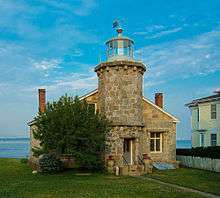 Stonington Harbor Lighthouse | |
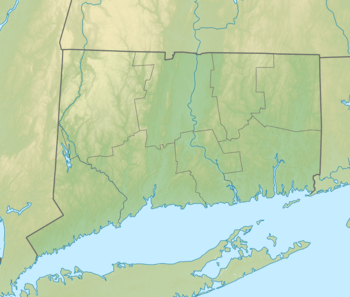 Connecticut | |
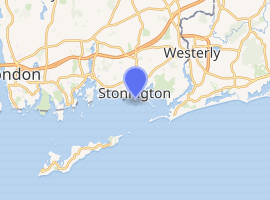
| |
| Location | Stonington Connecticut United States |
|---|---|
| Coordinates | 41°19′42.6″N 71°54′20″W |
| Year first constructed | 1823 (first) |
| Year first lit | 1840 (current) |
| Deactivated | 1889 |
| Construction | granite tower |
| Tower shape | octagonal pris tower with balcony and lantern attached to the front keeper's house |
| Tower height | 35 feet (11 m) |
| Focal height | 62 feet (19 m) |
| Original lens | 6th order Fresnel lens (1856) |
| Current lens | none |
| Range | 15 miles (24 km) |
| Characteristic | F G 5s. |
| ARLHS number | USA-813 |
| USCG number | 1-25195 |
| Managing agent | Stonington Historical Society (Old Lighthouse Museum)[1][2] |
| Heritage | place listed on the National Register of Historic Places |
Stonington Harbor Lighthouse | |
| Area | 1 acre (0.40 ha) |
| Built | 1840 |
| Built by | John Bishop |
| Architectural style | Lighthouse |
| NRHP reference No. | 76002000[3] |
| Added to NRHP | January 1, 1976 |
Description and history
The Stonington Harbor Light is located at the southern end of Stonington Point, marking the eastern side of Stonington Harbor. The light station consists of the tower and keeper's house; both are built out of large granite blocks, and the keeper's house has a wood-framed ell attached. The tower is an octagonal stone structure 35 feet (11 m) in height and 10 feet (3.0 m) in diameter, with a circular glass lantern house on top. The house is 1½ stories and about 30 feet (9.1 m) square.[4]
The federal government built a lighthouse on Windmill Point in Stonington Harbor in 1824; it was housed in a small granite lighthouse and was known by the same name. However, erosion led to its being torn down and its materials reused in the construction of this lighthouse. The light was originally lit by an oil lamp and broadcast by eight parabolic reflectors. This technology was already obsolete at the time of the lighthouse's construction, and it was replaced by a sixth-order Fresnel lens in 1856.[4]
In the 1880s, the Stonington Breakwater Light was constructed farther out in the harbor, and the Stonington Harbor Light was decommissioned in 1889. The site is now the home of the Stonington Historical Society which uses the building as The Old Lighthouse Museum. Holdings in the museum document the area's long and distinguished cultural and nautical history, and exhibits include the 1856 Fresnel lens.
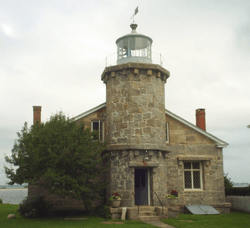

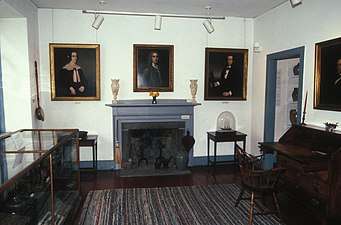
- View from the lantern room
- Another view from the lantern room
Head keepers
- Neil Martin 1882
- Nahor Jones 1882 – 1886
- Samuel C. Gardiner 1886
- John Ryle 1886 – 1887
- Samuel A. Keeney 1887 – 1903
- Maurice Russell 1903 – 1904
- Adolph Obman 1904 – 1907
- John J. Cook 1907 – 1909
- William Janse 1909
- Adolph Obman 1909 – 1911
- Robert R. Laurier 1911 – 1912
- John H. Paul 1912
- Joseph Meyer 1913
- Charles R. Riley 1915 – 1916
- Edward Grime 1917 – 1919
- George Washington Denton, Jr. 1919
- Edward Murphy 1919 - 1920
- Edward Iten 1921 – 1927
- Edward M. Whitford 1929
- Robert M. Fitton 1930
- Raymond F. Bliven 1930 – 1931
- Martin Luther Sowle 1938 – 1953[5]
See also
References
- Stonington Harbor The Lighthouse Directory. University of North Carolina at Chapel Hill. Retrieved 23 June 2016
- Connecticut Historic Light Station Information & Photography United States Coast Guard. Retrieved 23 June 2016
- "National Register Information System". National Register of Historic Places. National Park Service. November 2, 2013.
- "NRHP nomination for Stonington Harbor Light". National Park Service. Retrieved 2018-04-10.
- Lighthouse Friends
- Crompton, Samuel Willard. "The Lighthouse Book." Barnes and Noble Books, New York, 1999. ISBN 0-7607-1135-6.
External links
| Wikimedia Commons has media related to Stonington Harbor Light. |
- lighthouse.cc: Stonington Harbor Light Light
- lighthousefriends.com: Inventory of Historic Light Stations
- Old Lighthouse Museum - Stonington Historical Society